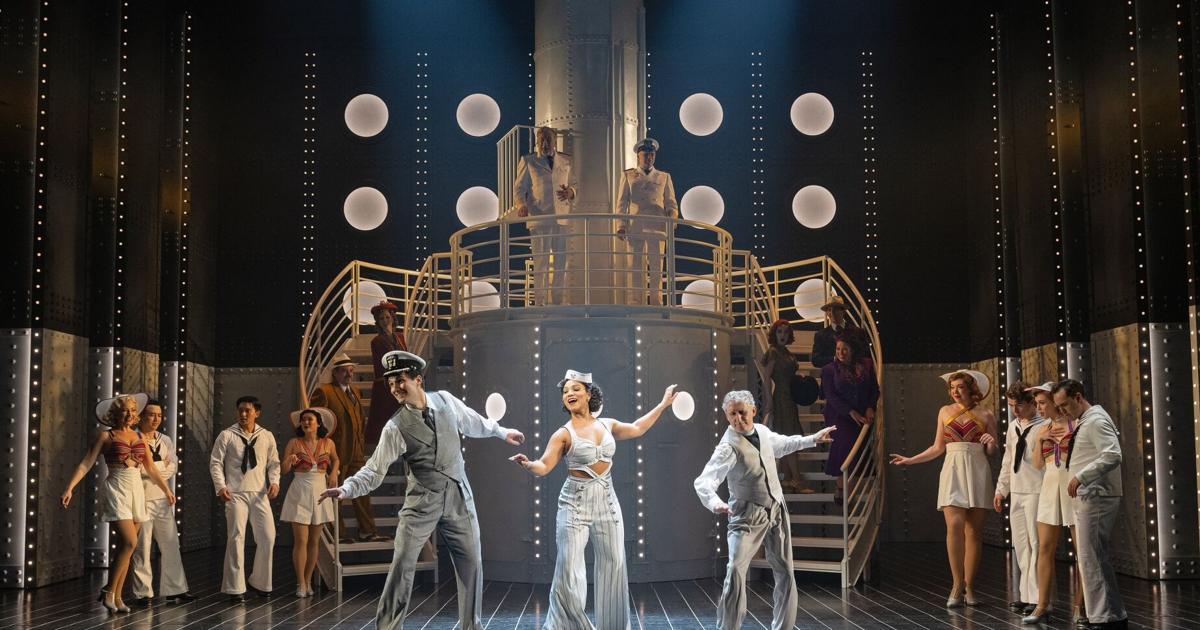NIAGARA-ON-THE-LAKE — There are few directors in southern Ontario who can successfully, and consistently, stage ritzy song-and-dance musicals at scale, with Broadway-sized designs and budgets. Donna Feore, the queen of Canadian musical theatre, whose Stratford Festival productions could rival in extravagance almost anything in New York City, has long proved that she’s one of those creatives.
But there’s another name you can add to that list: Kimberley Rampersad. A performer-turned director and choreographer (like Feore), she co-directed and choreographed last year’s sumptuous production of “My Fair Lady” at the Shaw Festival. She has followed it up this season with a delirious revival of “Anything Goes,” Cole Porter’s classic musical romp set on the high seas.
This lustrous new production, currently running at the Festival Theatre, more than lives up to the spirit of its title. And throughout, Rampersad demonstrates how exactly one should captain this 91-year-old musical for a successful sailing: stage it with freewheeling abandon, while ensuring that the story’s light comedy and repartee always remain buoyant.
Rampersad’s “Anything Goes” is filled with one inventive choice after another, all packaged with a boatload of giddy merriment. Her choreography, in particular, never fails to dazzle. There are brassy tap sequences, characters sliding down railings and even an ingenuous bit involving lifebuoys — all staged on Cory Sincennes’ revolving nautical set that’s used to great effect, especially in the playful duet “You’re the Top.”
That the team behind this revival has fully embraced the musical’s glitz and glam is all for the best. The show, after all, whose loose plot has been retooled countless times since it debuted, is really only a vessel for its big, show-stopping songs, with its unlikely, hijinks-filled plot playing second fiddle to the spectacle.
(The original book is by P.G. Wodehouse and Guy Bolton, along with Howard Lindsay and Russel Crouse. This newer version, which retains much of the same narrative as the original but updates the story for contemporary sensibilities, is penned by John Weidman and Crouse’s son, Timothy.)
Set aboard the S.S. American ocean liner, en route from New York City to London, the musical follows the antics of the ship’s crew and passengers. Among its most high-profile celebrities is Reno Sweeney (Mary Antonini), an evangelist-turned nightclub singer who’s travelling to England with her posse of showgirls. Also aboard: Reno’s friend Moonface Martin (Michael Therriault), a bumbling gangster who’s disguised as a travelling Christian priest.
The main story, however, concerns another one of Reno’s friends, Billy Crocker (Jeff Irving), a boyish and hapless young Wall Street broker who’s rejected Reno’s advances and instead is in love with Hope Harcourt (Celeste Catena). Trouble is that Hope is already engaged, rather reluctantly, to the far older Lord Evelyn Oakleigh (Allan Louis), with the pair — accompanied by Hope’s mother Evangeline (Sharry Flett) — on their way to England for the marriage.
So, with the help of Reno and Moonface, Billy stows away on the ship in disguise, first as a sailor and then assuming the identity of a man whom he later learns is a notorious criminal known as Public Enemy Number One.
Squint too hard at “Anything Goes” and you’ll notice plot holes galore and a bevy of all-too-convenient conclusions. By the second act, the musical more or less becomes a revue set on a ship.
What Rampersad’s production does so effectively is give the audience enough to gawk at to distract from some of the leaks sprung in the vessel itself.
Where this voyage hits some rough waters, however, is in its central casting of Reno, the musical’s anchor. While Antonini is certainly a fiery dancer and acts the hell out of the role, lending the character a sultry and world-wise edge, she sounds vocally miscast. Her lower range is gorgeously smoky and mellow. But her head voice is surprisingly thin and tight. In the rousing numbers like “Blow, Gabriel, Blow” and the show’s title song, she’s unable to sing with the powerhouse belt that Porter’s score requires.
Also lacking some energy at the performance I attended was the orchestra, conducted by Paul Sportelli, with a brass section that sounded especially muted.
In the end, it’s the supporting performances that help to right this ship. Therriault nails the humour, without ever going overboard, as Moonface. As his promiscuous sidekick Erma Latour, Kristi Frank also shines.
Irving makes for a charming Billy, with a winning voice to match. But the most impressive standout in the ensemble is Catena, as Hope, turning what’s usually a thankless ingenue role into a character that feels completely rounded.
“It’s delightful, it’s delicious, it’s de-lovely,” she sings delicately in one of the musical’s most tuneful numbers. The same could be said about this production as a whole, which ultimately comes out on top.



